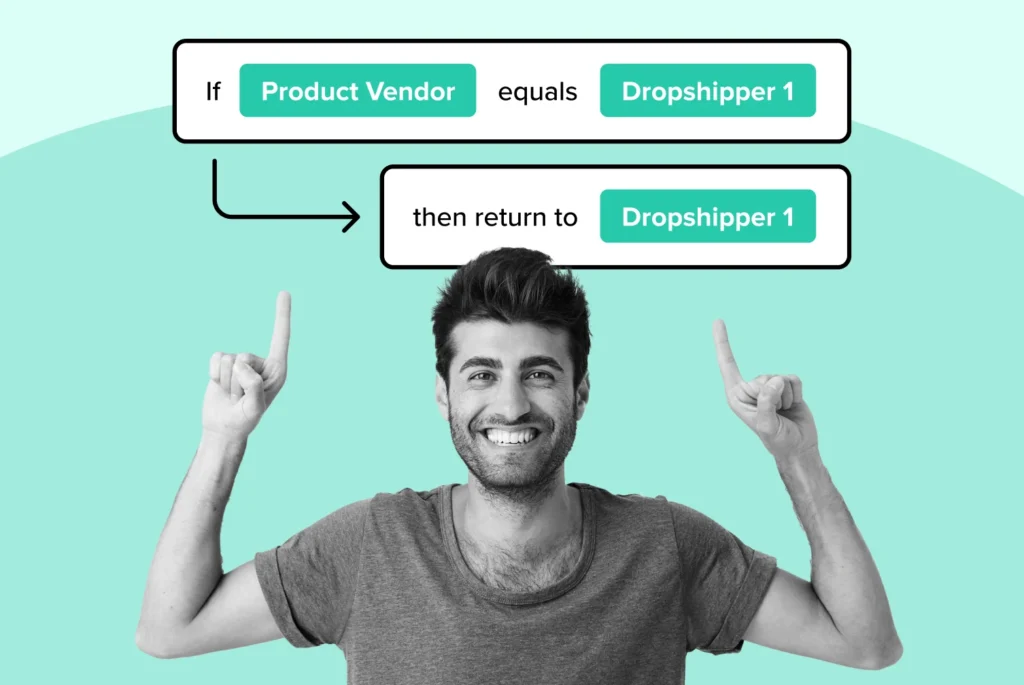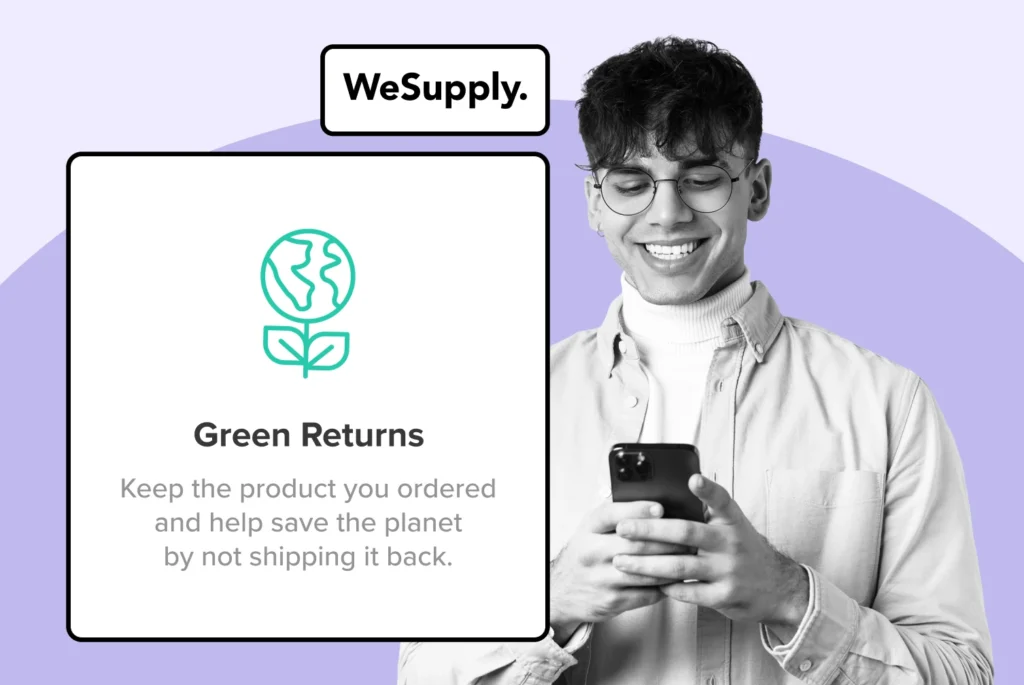
Dropshipping Guide: Master the Art of E-commerce
This article demystifies dropshipping, offers clear steps for getting started, and divulges expert tactics for thriving in online retail!
Shipping, Tracking & Notifications
Boost customer experience and reduce support tickets
Realtime order and shipment tracking
Proactive order and shipping notifications
AI-Enhanced Discounted Labels
Predictive pre-purchase estimated delivery dates
Self-Serivce branded order tracking
Effortless experience delivered
Identify and Resolve Order Issues
Realtime order and shipment tracking
Make returns profitable and delight customers
Flexibility to define any return destinations & conditions
Simplify returns for your customers and team
Incentivize exchanges over returns
Returns management made easy for your team
Returns management made easy for your team
Easy claims and smart upsells
Understand why your customers are returning
In-Store & Curbside Pickup
Unify the online and the in-store experience
Hassle-free pickup experience for customers
In-Store dashboard to keep operations streamlined
In-Store and Online orders unified
Drive foot-traffic to your stores
Shipping, Tracking & Notifications
Boost customer experience and reduce support tickets
Realtime order and shipment tracking
Proactive order and shipping notifications
AI-Enhanced Discounted Labels
Predictive pre-purchase estimated delivery dates
Self-Serivce branded order tracking
Effortless experience delivered
Identify and Resolve Order Issues
Realtime order and shipment tracking
Make returns profitable and delight customers
Flexibility to define any return destinations & conditions
Simplify returns for your customers and team
Incentivize exchanges over returns
Returns management made easy for your team
Returns management made easy for your team
Understand why your customers are returning
In-Store & Curbside Pickup
Unify the online and the in-store experience
Hassle-free pickup experience for customers
In-Store Dashboard to keep operations streamlined
In-Store and Online orders unified
Drive foot-traffic to your stores
Boost customer experience and reduce support tickets
Realtime order and shipment tracking
Proactive order and shipping notifications
AI-Enhanced Discounted Labels
Predictive pre-purchase estimated delivery dates
Self-Serivce branded order tracking
Effortless experience delivered
Make returns profitable and delight customers
Flexibility to define any return destinations & conditions
Simplify returns for your customers and team
Incentivize exchanges over returns
Returns management made easy for your team
Equip your team for precise return checks.
Easy claims and smart upsells
Understand why your customers are returning
Unify the online and the in-store experience
Hassle-free pickup experience for customers
In-Store Dashboard to keep operations streamlined
In-Store and Online orders unified
Drive foot-traffic to your stores
Find the answer to all your questions
Take a step by step trip through our functionality to see how we can improve your ecommerce processes.
Explore the most comon questions about WeSupply
Calculate the ROI that WeSupply can bring you
Request a no strings attached review of your current shopping experience and missed conversion opportunities
Read actionable articles on how to optimize your post-purchase experience and decrease support tickets
Get inspired by stories of how our customers implemented an effortless post-purchase experience
Wondering if WeSupply is a good fit for you? Read through our use cases to see how we can help you increase conversion & improve CX!
A Deep Dive into Top Companies' Order Tracking & Returns Strategy
Find the answer to all your questions
Explore the most comon questions about WeSupply
Calculate the ROI that WeSupply can bring you
Request a no strings attached review of your current shopping experience and missed conversion opportunities
Take a step by step trip through our functionality to see how we can improve your ecommerce processes.
Read actionable articles on how to optimize your post-purchase experience and decrease support tickets
Get inspired by stories of how our customers implemented an effortless post-purchase experience
A Deep Dive into Top Companies' Order Tracking & Returns Strategy
Wondering if WeSupply is a good fit for you? Read through our use cases to see how we can help you increase conversion & improve CX!

Are you navigating the shift towards a greener ecommerce model? Finding the best practices for sustainable ecommerce is crucial for businesses aiming to respond to customer demand for environmental consciousness. This concise guide cuts through the noise, presenting direct, actionable strategies to enhance sustainability in your ecommerce business. From choosing eco-friendly packaging to implementing low-carbon shipping methods, you’ll discover how to marry profitability with responsibility—essential in today’s market.
The rising consumer demand for sustainable products and practices offers a strategic opportunity for eCommerce businesses, with environmental consciousness driving purchasing behavior and potentially leading to cost savings and increased customer loyalty.
Online retail’s environmental impact, including increased shipping and packaging waste, high rates of product returns, and fast shipping demands, needs immediate action towards sustainable eCommerce strategies, such as adopting eco-friendly materials, green logistics, and enhancing recycling programs.
Embracing sustainability as a core value is imperative for brands, with the shift towards eco-conscious branding influencing consumer perceptions and purchase decisions, and requiring transparency and verifiable eco-friendly practices to build customer trust and loyalty.
WeSupply pioneers sustainable eCommerce with intelligent returns management, flexible policies, and eco-friendly delivery options. It champions environmental responsibility by facilitating store return points, promoting “Green Returns,” and offering printerless QR code returns to reduce waste. With solutions like Buy Online Pickup in Store (BOPIS), curbside pickups, and digital receipts, WeSupply decreases shipping emissions and paper usage. These initiatives not only advocate for the planet but also enhance customer loyalty and operational efficiency. Get Started with WeSupply!
The surge in consumer demand for sustainable practices cannot be overlooked. Between 2017 and 2021, the number of Americans alarmed about global climate change nearly doubled, indicating a significant shift in consumer behavior.
More than half of consumers in the US and UK are seeking products with reduced packaging from online brands. Additionally, one-third of US consumers are willing to pay extra for eco-friendly delivery.
This increasing demand for sustainable products and practices presents a strategic opportunity for eCommerce businesses. According to a Nielsen report, 73% of shoppers are willing to change their consumption habits in order to minimize environmental impact. This indicates a strong willingness among consumers to make environmentally conscious choices. Consequently, eCommerce businesses are recognizing the benefits of going sustainable, with both prominent brands and smaller Direct-to-Consumer (DTC) brands making a shift towards sustainability.
When we think about sustainable eCommerce, several components come to mind: eco-friendly packaging materials, sustainable shipping practices, and the adoption of a sustainable supply chain, among others. But it’s not just about these elements in isolation. To make your eCommerce business more sustainable, these practices need to be integrated holistically, creating a sustainable brand that resonates with consumers’ growing desire for a more sustainable future.
Moreover, the shift towards sustainability in eCommerce isn’t just about meeting consumer demand or reducing environmental impact. It’s a strategic move that can lead to cost savings, increase customer loyalty, and even drive innovation. By adopting sustainable practices, businesses are not only contributing to a more sustainable future but also paving the way for greater success in the long run.
The rise of eCommerce has led to a significant increase in shipping containers and materials, escalating the industry’s environmental impact. Additionally, the demand for fast shipping, especially in the last mile of delivery, adds to the ecological footprint of online retail.
A study found that mall shopping can be up to 60% more environmentally sustainable than online shopping, primarily due to increased returns and additional packaging. Online shopping leads to five times more returned products, contributing to a higher environmental impact. Approximately 40% of online purchases are returned compared to 7% in brick-and-mortar stores.
The industry, therefore, needs to take immediate action to mitigate these impacts and move towards sustainable eCommerce.
The business case for adopting eco-friendly practices in eCommerce is compelling. A significant shift in consumer behavior indicates an increasing willingness to spend more on sustainable products, with a 71% increase in Google searches for sustainable goods between 2016 and 2021. Therefore, eCommerce businesses that adopt sustainable practices can attract more customers due to the rising demand for environmentally responsible brands. Some sustainable practices that eCommerce businesses can consider include:
Using renewable energy
Reducing shipping emissions
Implementing recycling programs
Offering eco-friendly packaging options
By implementing these practices, eCommerce businesses can not only contribute to a greener future but also gain a competitive edge in the market.
Additionally, by adopting sustainable practices, businesses can:
Reduce their impact on the planet
Cut back on plastic packaging
Decrease reliance on fossil fuels
Consume fewer natural resources
Run on renewable energy
Use electric vehicles for deliveries
These practices can result in cost savings for businesses, as renewable energy can be cheaper and electric vehicles can cut fuel costs.
Sustainable eCommerce strategies can save businesses money by reducing packaging waste and utilizing recycled materials, which may also offer tax benefits in some countries. Electric vehicles, which are being incentivized by some governments, can reduce transport emissions and operational costs for eCommerce businesses.
Empowering customers by involving them in sustainability efforts can also enhance customer loyalty. For example, businesses can involve customers in plastic offsetting initiatives, which often involve calculating the plastic footprint of a product and investing in projects that remove the same amount of plastic from the environment. Offering clear recycling instructions and reducing barriers to recycling can improve customer engagement and satisfaction, contributing to brand loyalty.
Moreover, extending return policies can reduce the frequency of returns, decreasing the environmental impact associated with returns and potentially reducing costs. The growth of the recommerce market, where previously owned items are sold online, presents opportunities for eCommerce businesses to engage in the circular economy, thereby reducing waste and attracting eco-conscious customers.
WeSupply leverages sustainability to achieve cost reduction and enhance customer loyalty by smartly integrating intelligent dispositions and flexible return policies. By directing returns to appropriate channels such as recycling centers, it not only makes a positive environmental impact but also optimizes logistics costs. Additionally, WeSupply empowers businesses to create custom return policies, allowing for extended return periods and tailored handling of final sale items and return approvals. This customization fosters a positive shopping experience, building stronger customer loyalty through transparency and flexibility.
Key Features:
Custom Return Policies: Enables businesses to tailor policies on final sale items, return window lengths, and return request approvals, enhancing the customer experience and loyalty.
Harnessing these strategies, WeSupply stands at the forefront of fostering sustainability while simultaneously driving ROI for businesses. By mitigating waste, optimizing return logistics, and reinforcing customer loyalty through bespoke return policies, WeSupply not only embodies environmental responsibility but also translates these actions into tangible financial gains for businesses. The intelligent disposition of returns and the flexibility of custom return policies are crucial levers in enhancing both customer satisfaction and operational efficiency, leading to a direct positive impact on a company’s bottom line. Discover how WeSupply can amplify your ROI through sustainable practices. Try our ROI Calculator today to see the difference for yourself
As consumer awareness of environmental issues increases, aligning a brand’s philosophy with sustainability has evolved from a niche trend to a global imperative. Brands adopting sustainability as a core value can appeal to eco-conscious consumers who prioritize the planet’s well-being alongside their own.
Eco-conscious branding is regarded as a fundamental aspect of how consumers perceive and interact with brands, influencing purchasing decisions and brand loyalty. A brand’s reputation is now directly intertwined with its eco-conscious practices, and meaningful steps towards sustainability can significantly influence consumer perceptions.
In today’s market, transparency in communicating a brand’s sustainability efforts is essential to build trust with eco-conscious consumers who expect honesty about both successes and challenges in sustainability. Brands like Patagonia exemplify transparency by:
Providing detailed information on their sustainable practices
Sharing their supply chain and production processes
Disclosing their environmental impact
Engaging in open dialogue with consumers
This level of transparency builds trust and educates consumers on the importance of sustainable choices.
Eco-conscious branding involves:
Adopting sustainable practices
Effectively communicating these efforts through eco-messaging, storytelling, and cause marketing
Ensuring genuine sustainability efforts are well-documented and can benefit from independent verification and third-party certifications
To avoid skepticism and greenwashing accusations, brands must follow these steps.
Articulating a clear and authentic green brand philosophy involves outlining specific goals, such as reducing carbon emissions or achieving zero waste, and detailing the strategies to reach these objectives. Effective communication of a green brand philosophy involves engaging with customers on social media platforms to spread awareness and encourage dialogue on sustainability issues.
The green consumer, who is mindful of the environmental, social, and ethical implications of their purchases, shapes perceptions of brands based on their commitment to sustainability. The entire product lifecycle is considered in eco-conscious branding, from sustainable sourcing to eco-friendly packaging and energy-efficient manufacturing.
Marketing plays a crucial role in connecting brands with eco-conscious consumers. Some strategies for eco-conscious marketing include:
Eco-messaging
Storytelling
Cause marketing
Promoting green product labels
The North Face’s eco-conscious marketing initiatives like “Explore Mode” and promoting recycling and upcycling reinforce their dedication to sustainability and influence consumer perception.
Consumers increasingly expect brands to demonstrate a commitment to sustainability through actions rather than just words, making it vital for brands to align their external messaging with internal operations and values.
WeSupply has enabled retailers like Invicta, a distinguished provider of men’s and women’s watches, to implement sophisticated return policies ensuring products are returned to their respective locations and recycling warehouses efficiently. Invicta faced the challenge of managing returns for their globally shipped products, which often resulted in inefficiencies and delays in refunds due to products being returned to incorrect warehouses. By partnering with WeSupply, Invicta was able to automate their return process. This solution automatically detects the originating warehouse of each product and generates appropriate return labels, thus streamlining the process for both the company and its customers. The result was a premium brand experience for Invicta’s customers, characterized by efficient multi-location returns, proactive return notifications, and a reduction in the need for manual intervention, thereby accelerating the refund process.
Unlock the secret to seamless customer returns and unparalleled service excellence. Dive into the full case study to explore how Invicta transformed challenges into opportunities with WeSupply.
The transformation of the eCommerce industry through sustainable practices is underway, with innovations emerging in multiple areas. Some of these innovations include:
Redesigning supply chains and logistics to reduce carbon emissions and waste
Embracing eco-friendly materials for products and packaging
Adopting minimalist design principles to reduce resource consumption
Implementing renewable energy sources for powering warehouses and fulfillment centers
These innovations are shaping a sustainable future for sustainable ecommerce business.
Sustainable innovations in eCommerce logistics include the adoption of green technology, such as electric vehicles for last-mile delivery, which are feasible for the shorter distances involved in this part of logistics. Alternative fuels like hydrogen-based or biofuels are being considered to run logistics fleets to reduce greenhouse gas emissions drastically.
One of the most exciting innovations in eCommerce logistics is the exploration of drones for short-distance deliveries in last-mile logistics to reduce the carbon footprint from delivery vehicles and decrease road congestion. Autonomous vehicles promote fuel efficiency and can be used for last-mile deliveries in areas that support their infrastructure, leading to reduced emissions and operating costs.
In addition to these, the use of advanced technologies such as IoT and blockchain in logistics enhances supply chain visibility and optimizes resource allocation, including identifying route issues for fuel optimization. Warehouse management systems and other software reduce the carbon footprint by enabling cloud-based operations, reducing electricity usage, and minimizing paper-based documentation through digital solutions.
These innovations not only make eCommerce shipping more efficient and cost-effective but also significantly reduce its environmental impact. By adopting these strategies, eCommerce businesses can ensure that their operations are sustainable and align with the growing demand for eco-friendliness among consumers.
Embracing eco-friendly materials and minimalist design in product packaging is a key sustainable innovation that aims to reduce the carbon footprint and waste associated with packaging in eCommerce. Circular logistics practices encourage the reuse of packaging materials by incentivizing customers to return undamaged packaging for discounts or freebies, promoting a cycle of reuse and recycling.
Some eco-friendly packaging materials include:
Paper and cardboard, which can be easily reused and recycled by consumers
Bioplastics, often made from plant-based materials like corn starch and wheat straw, which can biodegrade much faster than traditional plastics and produce significantly fewer greenhouse gases in landfills
Corrugated bubble wrap, which is made from recycled materials and is biodegradable
Jute, a natural fiber that is renewable and biodegradable
These materials are paving the way for a more sustainable future in eCommerce.
The environmental impact of eCommerce is a growing concern that needs to be addressed urgently. One of the most significant issues is the increase in shipping containers and materials due to the rise of eCommerce, which escalates the industry’s environmental impact. Additionally, the demand for fast shipping, especially in the last mile of delivery, further adds to the ecological footprint of online retail.
The high rate of returns in online retail also contributes to the environmental burden. With a return rate in retail jumping to 16.6% in 2021, the reverse logistics further contribute to packaging waste and transportation emissions. These are just a few of the many environmental challenges that the eCommerce industry faces.
E-commerce has significantly increased packaging waste, including excess packaging such as cardboard boxes, plastic envelopes, or padded envelopes, contributing to environmental pollution. The World Economic Forum reported that e-commerce packaging accounts for 165 billion packages annually, a number which is expected to continue growing.
Online shopping generates various kinds of waste, including packaging waste, electronic waste, and carbon emissions due to the transportation of goods. Amazon alone generated 465 million pounds of plastic packaging waste in 2019, contributing to the approximately 7 billion packages they delivered.
In light of these issues, it is crucial for eCommerce businesses to take immediate action to mitigate these impacts. One of the ways to do this is by adopting sustainable practices that significantly reduce waste and emissions.
Implementing sustainable practices can significantly mitigate the environmental burden of eCommerce. One of the most effective ways is to use sustainable packaging materials, such as compostable mailers or recyclable boxes. These can significantly lower the environmental impact of shipping. Efficiently packing orders in appropriately sized packaging reduces waste and allows for more space-efficient transportation.
Furthermore, allowing customers to offset carbon at checkout by participating in programs that help decrease greenhouse gas emissions can raise awareness and reduce the harmful effects of shipping. By implementing these and other strategies, eCommerce businesses can effectively reduce their environmental impact and contribute to a more sustainable future.
WeSupply is addressing the environmental impact of eCommerce by introducing innovative solutions that streamline the return process while minimizing waste. By making stores a drop-off point for online returns, WeSupply eliminates the need for shipping boxes and labels, thus reducing waste. The “Green Returns / Keep the Item” initiative encourages businesses to refund customers for unwanted items without the need to ship them back, cutting down on transportation emissions and preventing products from ending up in landfills. Additionally, the clear communication on non-returnable items reduces unnecessary logistics, and the provision for printerless returns via QR codes further decreases paper waste. These initiatives not only enhance customer experience but also significantly contribute to environmental sustainability.
Key Features:
Green Returns / Keep the Item: Offers refunds for unwanted items without the necessity of returns, reducing waste and emissions.
Non-Returnable Items: Clearly communicates which items cannot be returned, reducing unnecessary logistics.
Automatic Return Labels: Simplifies the return process by automatically generating return labels.
Printerless Returns via QR Code: Facilitates returns without the need for printed labels, reducing paper waste.
Return In-Store or via Curbside: Embraces a convenient, drive-through-like process for returns, adopted by major retailers.
Join us in transforming ecommerce logistics for a sustainable tomorrow. Ready to see how? Book your WeSupply demo now and take the first step towards greener returns!
Speed up returns process
Book a quick call with our experts to see how WeSupply’s self-service returns makes it super easy for your customers to return anything, anytime – without needing to submit customer support tickets or call in!
Consumers’ attitudes towards buying behavior have seen a significant shift in recent years, with a growing preference for sustainable and eco-friendly products. As a result, eCommerce businesses are increasingly finding the need to cater to these eco-conscious consumers, who prioritize sustainability in their purchasing decisions.
This shift towards sustainable consumption is not just a trend but an enduring change in consumer behavior. An international survey during the second wave of the COVID-19 pandemic explored the readiness of individuals to engage in purchasing green and sustainably manufactured products. The survey indicated that the pandemic offered an opportunity to promote sustainable consumption, but it was not a game-changer in altering consumption patterns.
The COVID-19 pandemic has had a profound impact on consumer behavior, with some consumers re-evaluating their consumption habits and considering sustainability more seriously. Respondents from 31 countries participated in the survey, revealing diverse international perspectives on sustainable consumption during the pandemic.
Sustainable consumption patterns were influenced by factors such as trust in product sustainability, financial accessibility of sustainable products, and availability in local markets. The results emphasized the need for manufacturers to raise consumer trust in the sustainability of their products through greater transparency.
The survey highlighted that while there is a shift towards sustainable consumption due to the pandemic, this shift is more pronounced among those with a medium level of sustainable consumption behavior as opposed to those with a high level. The study also identified barriers, such as lack of trust in product sustainability claims and financial constraints, that prevent consumers from engaging more fully in sustainable consumption.
In the face of growing consumer demand for eco-friendly products and practices, eCommerce businesses need to engage effectively with these consumers. This involves demonstrating a genuine commitment to sustainability, rather than treating it as just a marketing trend.
It’s essential for companies to communicate their sustainability efforts transparently, including the challenges and progress, to build trust with consumers. Here are some ways to do that:
Offer product certifications and labels that indicate the environmental impact of products
Provide detailed information about the sustainability practices and initiatives of the company
Collaborate with credible environmental organizations to boost the brand’s eco-friendly image and provide additional assurance to consumers
By implementing these strategies, companies can effectively communicate their sustainability efforts and engage with environmentally conscious consumers.
In the eCommerce sector, sustainability is more than an environmental responsibility – it’s a key driver for long-term business success. Studies indicate that customers are more likely to trust and remain loyal to brands that engage in sustainable practices. By optimizing areas like:
packaging
logistics
sourcing
energy usage
Through green practices, companies can achieve substantial cost reductions and operational efficiencies while reducing greenhouse gas emissions.
Sustainable businesses often encourage innovation by creating new solutions to maintain product or service quality while adhering to sustainability principles. Adopting eco-friendly practices can enhance a company’s reputation, provide cost savings, offer a competitive advantage, ensure compliance with regulations, and increase employee satisfaction.
Eco-friendly practices in e-commerce can lead to long-term cost savings through efficient resource utilization and waste reduction. E-commerce businesses that offer sustainable products and services gain a competitive advantage in the market as consumer demand for eco-friendly options rises.
Implementing eco-friendly practices can help e-commerce businesses ensure compliance with increasingly strict environmental regulations, avoiding penalties and fines. By adopting sustainable practices, e-commerce businesses can attract and retain top talent as employees prioritize sustainability in their employment choices.
Moreover, transitioning to eco-friendly packaging and eliminating single-use plastics from operations can:
Reduce carbon emissions
Reduce environmental harm
Result in long-term cost savings
Improve brand image.
The eco-friendly eCommerce market is projected to surpass USD 40.75 billion by 2030, growing at a Compound Annual Growth Rate (CAGR) of 15.38% from 2023 to 2030. This growth is driven by increasing consumer awareness of their purchasing decisions’ environmental and social impact, driving the demand for sustainable products and services.
Europe is expected to lead the sustainable e-commerce market, followed by the Asia Pacific region, due to increasing awareness and demand for environmentally conscious practices. The adoption of sustainable practices is also being fuelled by technological advancements, making them more affordable and accessible for businesses.
Sustainable packaging is essential in revolutionizing food supply chains, leading to reduced environmental impact and fostering positive change. Sustainable packaging solutions, like the use of eco-friendly materials and design techniques, reduce the usage of non-renewable resources and lower waste output.
The adoption of sustainable packaging is driven by the urgent need to address issues such as plastic pollution, food waste, and carbon emissions. Life cycle analysis is a critical approach in sustainable packaging, assessing the environmental impact of packaging at every stage, from raw material extraction to disposal.
Sustainable packaging in the food industry:
Minimizes the environmental footprint
Encourages recycling, composting, and repurposing
Prevents waste from ending up in landfills or incinerators
Reduces plastic pollution, landfill waste, resource depletion, and greenhouse gas emissions
Involves assessing environmental footprints, selecting eco-friendly materials, and designing for efficiency and minimalism
Closed-loop systems and Extended Producer Responsibility (EPR) mechanisms are adopted in supply chains to maximize the benefits of sustainable packaging. New regulations like EPR laws are shifting the responsibility of managing used packaging from municipalities to producers, mandating companies to pay fees for the type of packaging used. These regulations are fueling the drive towards sustainable packaging, as they encourage businesses to use less and more eco-friendly packaging to avoid these fees.
Eco-friendly materials such as bioplastics, paper-based packaging, and recycled materials align with circular economy principles and are increasingly being used in sustainable packaging. Minimalist and biodegradable packaging reduces waste by eliminating unnecessary layers and components and breaks down naturally, lessening the burden on landfills and oceans. Additionally, recyclable packaging contributes to a more eco-conscious approach in the industry.
Paper and cardboard are the most commonly used elements in eco-friendly packaging and can be easily reused and recycled by consumers. Bioplastics, often made from plant-based materials like corn starch and wheat straw, can biodegrade much faster than traditional plastics and produce significantly fewer greenhouse gases in landfills.
These materials, along with others like corrugated bubble wrap and jute, are paving the way for a more sustainable future in eCommerce.
Green shipping strategies and alternative transportation methods are vital to reducing the environmental impact of eCommerce. Ground-based shipping can be encouraged to limit air freight and reduce carbon footprint, and eCommerce businesses can incentivize this method by offering it at a reduced cost or for free. Another strategy is the Ships-in-Own-Container (SIOC) technique, which can be used to minimize packaging waste by shipping the item in its original packaging.
Consolidating customer orders can lower emissions by reducing the number of delivery vehicles required to ship orders. Furthermore, working with shipping and fulfillment partners committed to environmental responsibility, such as those implementing solar electricity generation, contributes to the adoption of eco-friendly delivery methods.
Sustainable packaging materials, such as compostable mailers or recyclable boxes, can significantly lower the environmental impact of shipping. Efficiently packing orders in appropriately sized packaging reduces waste and allows for more space-efficient transportation. Furthermore, allowing customers to offset carbon at checkout by participating in programs that help decrease greenhouse gas emissions can raise awareness and reduce the harmful effects of shipping.
Efficiently packing orders in appropriately sized packaging reduces waste and allows for more space-efficient transportation. Additionally, allowing customers to offset carbon at checkout by participating in programs that help decrease greenhouse gas emissions can raise awareness and reduce the harmful effects of shipping.
Finally, educating customers about reusing and recycling packaging can empower them to contribute to eCommerce sustainability. Simple and clear returns processes in e-commerce facilitate the resale or recycling of returned goods, promoting circular economy practices among consumers.
Major global carriers are beginning to adopt greener modes of transportation for deliveries, including electric vehicles, e-bikes, and delivery bots. Working with shipping and fulfillment partners committed to environmental responsibility, such as those implementing solar electricity generation, contributes to the adoption of eco-friendly delivery methods.
By selecting eCommerce platforms that offer a variety of eco-friendly shipping companies, businesses can align their operations with their green brand philosophy. Retailers can consider using electric vehicles or bicycles for urban deliveries to provide a zero-emission alternative to traditional fuel-powered fleets, which also aligns with consumer preferences for eco-friendly shopping.
WeSupply is pioneering eco-friendly delivery and return options to meet the growing demand for sustainable ecommerce practices. By offering services like Buy Online Pickup in Store (BOPIS) and Curbside Pickup, WeSupply reduces the carbon footprint associated with traditional shipping methods. Ship to Store options not only lessen environmental impact but also increase in-store traffic, creating a win-win for both retailers and consumers. The convenience of in-store returns drives additional revenue and foot traffic, while the option for customers to return items online streamlines the process. Moreover, digital receipts offer a sustainable alternative to paper, enhancing customer engagement with a branded experience. These initiatives demonstrate WeSupply’s commitment to reducing ecommerce’s environmental impact through innovative, eco-friendly solutions.
Key Features:
Buy Online Pickup at Curbside: Offers safe, contactless delivery, minimizing environmental impact.
Buy in Store Return Online: Facilitates easy online returns with a self-service return center.
Digital Receipts: Provides eco-friendly, fully-branded digital receipts, reducing paper use.
Step into a greener future with your ecommerce logistics. Ready to make a difference? Book your WeSupply demo today and embrace sustainability!
The circular economy in eCommerce aims to minimize waste and make the most use of resources. This involves adopting models such as rental, alternative markets for unsold goods, and resale models, which extend the lifespan of products and reduce the need for new resources.
Circular fashion business models are being adopted by the fashion industry as a solution to reconcile fashion with sustainability. These models aim to keep products in circulation for as long as possible, reducing the negative environmental impact associated with the traditional linear economy.
Transitioning to circular business models in eCommerce involves the adoption of models that extend the lifespan of products and reduce the need for new resources, thereby reducing the environmental footprint. Online luxury resale platforms are central to the circular economy in fashion, often providing authentication, curated offerings, consignment, and home pick-up services to enhance customer trust and facilitate circularity.
Consumer preferences are shifting toward sustainability, with a growing demand for pre-owned luxury items. This is driving the growth of online luxury resale platforms, encouraging consumers to buy, wear, sell, and repeat. Implementing reverse logistics is key to achieving a successful circular economy in eCommerce. It can lead to a stronger brand image, enhanced customer satisfaction, and increased profitability.
Incorporating circular economy principles such as product cascading and refurbishment can keep materials in circulation longer and reduce the need for new resources. Creating channels for recycling or waste management is also a part of transitioning to circular business models, and it is crucial for managing e-waste and other end-of-life products.
Encouraging resale among consumers is considered a fundamental solution to the environmental challenges caused by overproduction and consumption of fashion and textile products. Collaborative consumption platforms like online luxury resale are gaining popularity, allowing consumers to engage in large-scale sharing, thereby increasing product utilization and reducing disposal.
The online luxury resale industry is growing, driven by sustainability and affordability, and aims to overtake the demand for affordable and sustainable fashion by encouraging consumers to:
Buy
Wear
Sell
Repeat
Simple and clear returns processes in e-commerce facilitate the resale or recycling of returned goods, promoting circular economy practices among consumers.
The future of eCommerce lies in making sustainability a core business strategy. Changing consumer behavior towards sustainability is a key trend, with surveys indicating that 75% of Gen-Z shoppers prioritize sustainability over brand names when making purchases. The rise of the circular economy is becoming a significant trend, as it addresses the linear consumption cycle that leads to waste, by focusing on production, consumption, and reuse of products to extend their life and reduce the need for raw materials.
Advanced security technologies and transparent practices in e-commerce are becoming increasingly important to build consumer trust, which includes being transparent about sustainability efforts and protecting sensitive data related to green initiatives. The focus on sustainability and eco-friendliness in e-commerce is expected to intensify, with customers demanding platforms to offer eco-friendly options, reduce packaging waste, and embrace sustainable practices.
In conclusion, the future of eCommerce lies in sustainability. From aligning brand philosophy with sustainability to adopting greener modes of transportation, every aspect of eCommerce needs to be reimagined with sustainability at its core. Embracing the circular economy, encouraging resale, reuse, and collaborative consumption among consumers, and adopting eco-friendly practices are essential for ensuring long-term business success and reducing environmental impact.
WeSupply is revolutionizing sustainable eCommerce with solutions that minimize environmental impact and optimize customer satisfaction. Its strategy includes directing returns to eco-friendly channels, enabling flexible return policies, and reducing waste through initiatives like store drop-off points, “Green Returns,” and printerless QR code returns. WeSupply also promotes eco-friendly delivery options like Buy Online Pickup in Store (BOPIS) and curbside pickups to lower shipping emissions, alongside digital receipts to cut down on paper use. These efforts not only support sustainability but also enhance the shopping experience, proving that eco-conscious operations can go hand-in-hand with business efficiency. Elevate your store’s sustainability with WeSupply. Ready to lead the way in green eCommerce? Get Started with WeSupply today!
Combat inconvenience with proactivity & self service
Book a quick call with our experts to see how WeSupply can help you make returns easy for your customers with a beautiful, self-service solution that makes their experience easier while also providing new ways to lower costs and earn back revenue.
The most effective sustainability practice is to reduce, reuse, and recycle. Deploying these principles helps to preserve and protect natural resources by reducing landfill waste, energy consumption, and pollution.
WeSupply integrates intelligent returns management and flexible return policies with eco-friendly delivery methods to minimize environmental impact and enhance customer experience. This includes directing returns to appropriate channels, facilitating store and curbside returns, and promoting “Green Returns” where items need not be returned, thus reducing waste and emissions.
WeSupply reduces waste by allowing returns to be dropped off at stores without the need for boxes or labels, utilizing printerless QR code returns, and encouraging customers to keep items that would otherwise contribute to landfill waste. This not only lessens environmental impact but also simplifies the returns process for customers.
Yes, WeSupply offers solutions like Buy Online Pickup in Store (BOPIS) and curbside pickups, which reduce the need for shipping, thereby lowering emissions. Additionally, by optimizing the returns process and reducing unnecessary shipments, WeSupply contributes to a decrease in overall shipping-related emissions.
Yes, WeSupply does have an official Shopify App. You can download and begin to integrate it with your Shopify store.
Yes, WeSupply has an official extension for Magento. The WeSupply x Magento integration allows for automating order tracking experiences, reducing customer inquiries, automating shipping email and SMS notifications, and providing a fully branded order tracking experience
Yes, WeSupply has an official BigCommerce App. You can integrate WeSupply with your BigCommerce store to improve your post-purchase customer experience.
Learn How To Create Successful Post Purchase Email Campaigns
Build an effective post-purchase email flow that helps you increase customer satisfaction and drive revenue growth!
WeSupply is transforming the way businesses build Customer Lifetime Value by offering positive exchange experiences. By making exchanges effortless, WeSupply encourages customers to revisit your website for any product, without price constraints. Key features like using store credits or gift cards as partial payments not only increase order values but also reinforce customer loyalty. This approach is instrumental in enhancing Customer Lifetime Value, as it turns a simple exchange into a delightful shopping experience, fostering long-term customer relationships and ongoing business growth.

This article demystifies dropshipping, offers clear steps for getting started, and divulges expert tactics for thriving in online retail!

This guide distills the crucial mistakes that could be undermining your eCommerce success and equips you with the insights to avoid them!

This isn’t about reinventing the wheel: it’s about making smarter, evidence-based decisions that propel your eCommerce venture forward!

Discover practical, actionable advice for incorporating sustainable eCommerce into the core of holiday commerce practices!

The essential guide to making circular economy eCommerce returns practical and profitable, helping you step away from waste!

Insights on planning your return policy, adapting to customer needs, and ensuring your eCommerce footprint is as light as possible!

Vital sustainability metrics to track in eCommerce: from assessing carbon output to reducing packaging waste!

Environmental stakes are higher than ever: discover how your business can adapt its returns process to be part of a greener eCommerce future.

How luxury brands strive to ensure exclusivity in luxury returns: crucial for maintaining brand prestige and customer loyalty!